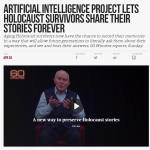News
Today, as the world struggles to contain and recover from Coronavirus, CBS 60 Minutes offers a story they completed just before the crisis. It is a story of history, hope, survival and resilience during the World War II and innovative way to keep such story alive. Artificial intelligence project by USC Shoah Foundation lets Holocaust survivors share their stories forever.
The Kazickas Family Foundation committed to help USC Shoah Foundation index 49 recorded testimonies of Holocaust survivors in Lithuanian, to create most suitable programming for the region and to present the tools to the teachers community. However, the work in the US goes far beyond just recording, it enables the Holocaust survivors to share their stories even after their death.
CBS Lesley Stahl reports on this fascinating project on the Sunday, April 5th edition of 60 Minutes. Please follow the link bellow to access program's recording.
From CBS 60 Minutes Overtime:
Artificial intelligence project lets Holocaust survivors share their stories forever
Millions perished in the Holocaust, but a group of survivors will now be able to live on, at least via real-time video conversations about their experiences and perspectives, forever. In an innovative attempt to harness the artificial intelligence technologies of the present and the future to keep alive the stories of the past, Holocaust survivors may be the first people ever to be able to continue carrying on conversations (virtually, at least) even after their deaths.
Heather Maio had worked for years on Holocaust-related exhibits and knew that "Schindler's List" director Steven Spielberg had created the Shoah Foundation to record the testimonies of thousands of Holocaust survivors. But Maio wanted to create something more interactive. "I wanted to talk to a Holocaust survivor like I would today, with that person sitting right in front of me," she told Stahl. Maio believed that artificial intelligence technology could make her notion realizable, so she pitched her idea to Stephen Smith, the executive director of the USC Shoah Foundation in Los Angeles, and now her husband.
Smith was intrigued, but some of his colleagues initially feared it could cheapen, or "Disney-fy" the Holocaust. "We had a lot of pushback on this project," Smith said. "'Is it the right thing to do… Are we trying to keep them alive beyond their deaths?' Everyone had questions except for one group of people, the survivors themselves, who said, 'Where do I sign up?'"
So far, more than 20 interviews, including one with a 93-year-old U.S. Army veteran who helped liberate a concentration camp, have been recorded. Each subject spends a full five days answering questions in an attempt to record responses to every question conceivable. The questions are then logged and alternative questions are entered into the database. Each interview is recorded with more than 20 cameras so that as technology advances and 3D, hologram-type display becomes the norm, all required angles will be available.
Three of the survivors interviewed have since died. One of them was Eva Kor, who appeared on 60 Minutes in 1992 to tell her story of having been experimented on, along with her identical twin sister, by Nazi S.S. physician Josef Mengele. Kor died last summer, but using the Shoah foundation's technology, Stahl was able to conduct another 60 Minutes interview with Kor's digital image. What was Mengele like? "He had a gorgeous face, a movie star face, and very pleasant, actually," Kors' digital image told Stahl. "Dark hair, dark eyes. When I looked into his eyes, I could see nothing but evil. People say that the eyes are the center of the soul, and in Mengele's case, that was correct."
Stahl interviewed the first Holocaust survivor filmed for the project, Pinchas Gutter, who was sent to the Majdanek concentration camp at age 11 and was the only member of his family to survive. Gutter was asked some 2,000 questions. Stahl spoke to him in person, but she also spoke to his digital image, which can now be seen in Holocaust museums in Dallas, Indiana and Illinois, where visitors can ask him their own questions. As many may wonder far into the future, Stahl asked Gutter how he can still have faith in God after the horrors he experienced. "How can you possibly not believe in God?" Gutter's digital image replied. "God gave human beings the knowledge of right and wrong and he allowed them to do what they wished on this earth, to find their own way. To my mind, when God sees what human beings are up to, especially things like genocide, he weeps."

